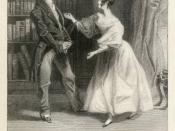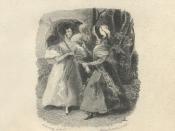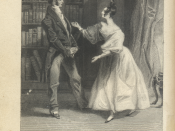Elizabeth's and Darcy's epithet (not literal but rather implied) of "Proud and Prejudiced" as the title of the book indicates, is clearly evident in the discourse and the use of pronouns found in extract "A" - chapter 10. Extract "B" - chapter 58, has an entirely different use of discourse and the "polarity of persons" is fundamentally different to that of extract "A", the "I" and "you" of Elizabeth and Darcy become increasingly more like a metaphorical "we" or "us" as the book progresses, bring about a new implied epithet of "humble and accepting". Benveniste refers to the use of pronouns as bringing one's "ego" into reality through the "othering" of people. The culture of politeness at the time that Jane Austin wrote Pride and Prejudice dictated that a person had to be far more subtle in their approach to, amongst others, insults. This was predominantly done through the change in indexicals, in the same manner we as the reader are able to pick up on the transition from; repulsion between Elizabeth and Darcy through to attraction and ultimately love, all as an event of language.
In extract "A" Mr. Darcy moves closer, "drawing near" - line 2, to Elizabeth , this is indicative of his affection towards her although it may be on a sub-conscious level. The reader can assume this as he moves his entire body towards her in a private manner. He then proceeds to "other" and mock her in line 4 by not including his own subjectivity in the discourse. "Do not you feel a great inclination, Miss Bennet, to seize such an opportunity of dancing a reel?" - In this "utterance" Mr. Darcy does not include himself in the discourse and refers to Elizabeth as "you", this creates a distance between the two as...


